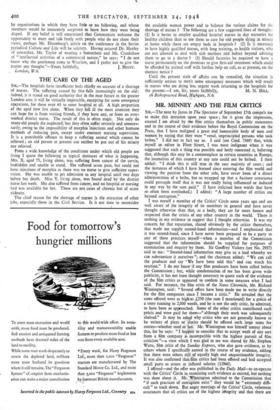THE 'CARE OF THE AGED
SIR,—The hospitals have insufficient beds chiefly on account of a shortage of nurses. The suffering caused by this .falls increasingly on the old: indeed, it is stated on good authority that in the near future in the greater London area it will be virtually impossible, excepting for some emergency operations, for those over 65 to enter hospital at all. A high proportion ef the aged now live alone. When they fall ill the most attention they can hope for is from visiting friends, if they have any, or from an over-. worked district nurse. The result of this is often tragic. Not only do many old people die neglected; but they often suffer severely and unneces- sarily, owing to the impossibility of morphia 'injections and other humane methods of reducing pain, except under constant nursing supervision. It is a punishable offence to keep a suffering animal which cannot be relieved ; an old person at present can neither be put out of his misery nor relieved.
From a wide knowledge of the conditions under which old people are living I quote the following as typical instances of what is happening. Mrs. X, aged 75, living alone, was suffering from cancer of the cervix, bedridden and unable to stand. She suffered acute pain, but could not have injections of morphia as there was no nurse to give sufficient super- vision. She was unable to get admission to any hospital until two days before her death. Miss Y, living alone, was found dead by the district nurse last week. She also suffered from cancer, and no hospital or nursing bed was available for her. These are not cases of chronic but of acute sickness.
The chief reason for the shortage of nurses is the attraction of other jobs, especially those in the Civil Service. Is it not time to reconsider
the available woman power and to balance the various claims for thc shortage of nurses ? The following are a few suggested lines of thought: (1) Is it better to employ qualified hospital nurses in day nurseries for healthy children than to use them to care for old people dying in misery at home while there are empty beds in hospitals ? (2) Is it necessary to have highly qualified nurses, with long training, as health visitors, who are not allowed to deal with sick mothers and babies beyond advising them to go to a doctor ? (3) Should factories be required to have a nurse permanently on the premises to give first-aid treatment which could be afforded by trained staff with further help on call, as at present, on the shortest notice ?
Until the present state of affairs can be remedied, the situation is sufficiently serious to merit some emergency measures which will result in nurses who are doing less urgent work returning to the hospitals for


































 Previous page
Previous page